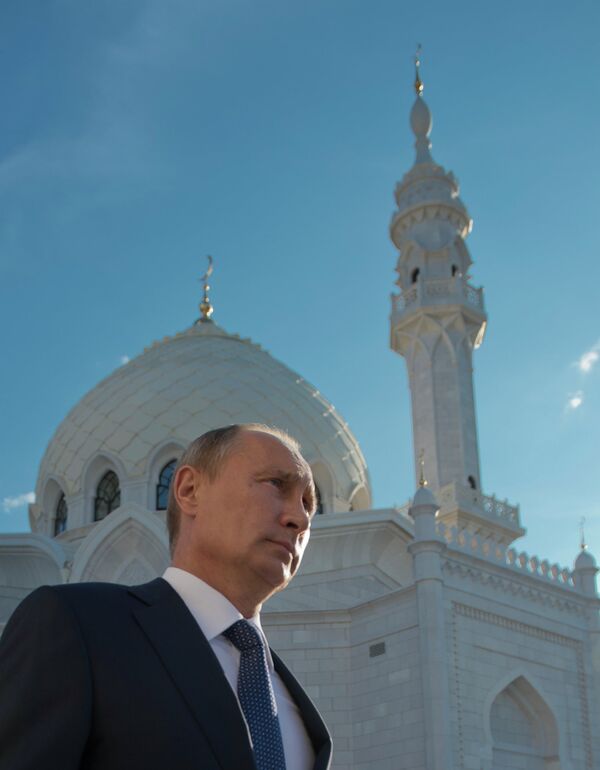As President Vladimir Putin arrived in the Volga Republic of Tatarstan on Tuesday to repeat his recent call for ethnic harmony among Russia’s multicultural population, a spate of violent killings spiked throughout the mainly Muslim North Caucasus region, leaving more than a dozen dead in one day and highlighting Russia's continuing struggle with a crippling Islamic insurgency.
In Dagestan, which has long since overshadowed neighboring Chechnya in its body count, seven people – including a leading Sufi cleric – were killed in a suicide bombing, while a border guard turned his automatic rifle on seven of his fellow soldiers before himself being killed.
The bloodshed, somewhat unprecedented even for volatile Dagestan, cast an unsettling background to Putin’s visit, during which he presented the Order of Friendship to Mufti Ildus Faizov and the Order of Courage to the widow of the slain Valiullah Yakupov – two official religious leaders targeted by local Islamic extremists in coordinated attacks in Kazan, the Tatarstan capital, on July 19.
“Terrorists and militants of all kinds, whatever ideological slogans they hide behind, always act cynically, behind one’s back, and have only one aim: to spread fear and mutual hatred,” he said during the visit.
But Putin’s comments, characteristic of a leader who has long placed a premium on stability as an Islamic insurgency has continued to rage along Russia’s southern flank, seemed to contradict the stark reality that despite the official end of the federal counterterrorism operation in Chechnya in April 2009, the violence rages on elsewhere. It has spread far beyond the Chechen borders to the neighboring republics of Dagestan, Ingushetia, and Kabardino-Balkaria, among others.
“It’s a low intensity conflict, and it’s going to keep dragging on and on,” said Simon Saradzhyan, a terrorism expert at Harvard University’s Belfer Center for Science and International Affairs.
And while experts say the Islamist insurgency, bound roughly by the self-proclaimed Caucasus Emirate led by Chechen warlord Doku Umarov, has been weakened since Chechen Head Ramzan Kadyrov’s consolidation of power, they also note its low-level persistence has become almost a given in the volatile region.
“They haven’t been able to mount spectacular attacks, such as raids on entire cities, but they do manage to organize effective bombings in the North Caucasus and outside the North Caucasus now and then, to remind their supporters, themselves and the authorities that they can still do this,” Saradzhyan said.
According to Kavkazky Uzel, a Russian news outlet focusing on the North Caucasus, 118 people fell victim to armed conflict in July alone – 78 of whom were killed. Dagestan ranked the bloodiest, with 54 deaths, while Ingushetia and Kabardino-Balkaria ranked second and third, with 10 and nine killed, respectively.
Chechnya came in fourth, with only four deaths, but experienced a relatively rare suicide bombing earlier this month in Grozny, the republic’s capital, in which at least one suicide bomber killed three Russian soldiers and injured three other people.
Perhaps more disconcerting, however, is the apparent recent spread of radical Islam, or Salafism, even beyond its conventional borders in the North Caucasus. The July attack in Kazan that killed Yakupov and injured Faizov was a frightening indication of its growing appeal among the region’s youth, which some experts say have been wooed by the North Caucasus movement’s brazenness and the perceived co-option of moderate Islam by the regional authorities.
Alexey Malashenko, an Islam expert at the Carnegie Moscow Center, says the past several years have seen an “accumulation of religious protest,” in which an increasing number of people have turned to radicalism to spite the authorities.
“The confrontation [in Tatarstan] between those who share Islamic traditionalism and something else – a ‘new’ Islam, such as Salafism – is very, very explosive, like we see in the Caucasus and everywhere else,” he said.
Malashenko also notes that the spread of fundamental Islam from the Caucasus and Central Asia, which plays host to such groups as the Islamic Movement of Uzbekistan and Hizb ut-Tahrir, adds to the “internationalization” of the trend.
This much became evident earlier this month, when two Chechens members of al-Qaeda, who are believed to be among the senior leadership of the organization in Europe, were charged by a Spanish judge with plotting a terrorist attack. The two men, Eldar Magomedov and Ankari Adamov, were arrested August 1 in Spain, attempting to cross the French border.
Some experts, however, are careful to draw a line between the homegrown North Caucasian insurgency and Russian fundamentalists operating abroad. According to Mark Galeotti, a Russian security expert and clinical professor at New York University, the two operations are largely distinct from one another.
“This is what happened to al-Qaeda, generally – what once upon a time was a coordinated movement has been shattered,” he said. “It has now become an ideology of loosely connected, but essentially autonomous, individuals and cells,” bound to a certain degree by shared beliefs, resources and possibly clan connections.
However, Galeotti noted, whether at home or abroad, Chechens remain among the most popular candidates for the “global jihad.”
“There are a lot of Chechens who feel particularly ignored, isolated, ruthless, and who therefore are more susceptible to the ideology of jihad, and to the idea that it’s worth giving everything up to strike a blow to bring some kind of real change,” he said.



